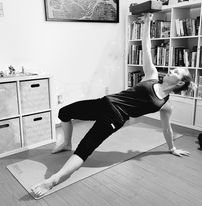 A few days ago, I had the honour of being invited for an interview with Sandra Kadel, the host of the German morning show 'Kaffeeklatsch mit Sandra’, on 91.5 Connect.FM. Since the interview was recorded in German, I thought I would translate it for you as I wouldn't want you to miss out on some important nutritional information that could help you get through this winter: What are your top 3 tips for a healthy winter diet? First of all, I think it's important to eat a great variety of seasonal fruit and vegetables. For example, carrots, broccoli, cauliflower and other types of cabbage contain all the the vitamins and minerals we need. Of course, don't forget about onion and garlic as they can help protect us from certain viruses and bacteria and support our immune system. Lastly, it always helps to heat yourself up from the inside-out with spices like chilli, ginger, turmeric and cinnamon. Which supplements should not be missing in a west-coast winter household? My favourite for a Vancouver winter is Vitamin D, as we don't get a lot of sunlight which is usually our main source. I take approximately 1000 to 2000 IU's a day, which is still considered a safe range (always check with your doctor however, if you have specific health issues). Vitamin D is known to strengthen the bones and helps combat SAD (seasonal affective disorder) - better known as the 'winter blues'. You can always get it through food as well, but you'd have to eat a lot of mushrooms and fish in order to make up for the lack of sunlight. Therefore, taking a supplement might be a good addition. Another important one - commonly found in citrus fruits and leafy greens - is Vitamin C, which helps strengthen the immune system. Last, but not least, B-vitamins. They can help improve your mood and calm the nerves. You can find most B-vitamins in beans, lentils, leafy greens and mushrooms. Vitamin B-12 is the only tricky one for which I recommend adding a high quality supplement - especially if you are vegan, or vegetarian. What keeps you going in the winter time? Since days are much shorter in the winter, I like to take advantage of the long nights by getting enough sleep (7-9 hours). I also alternate between meditation and breathing exercises and, of course, mobility and fitness exercises. What was your new year's resolution, and how does one manage to make them stick? Actually, I don't have any. Instead, I make sure to always have smaller projects throughout the year as you never now what could happen next and you need to be able to adapt quickly (just think of how unpredictable last year was due to COVID). My philosophy is that you can start anything at any point in time and you don't need to wait for the next year for that. However, when making resolutions of any kind, it is important to not pick too many goals, instead, focus on one (e.g. more exercise) and make sure you can apply that successfully to your life for long-lasting results.
0 Comments
 Have you ever wondered why you are doing crunches like crazy but never really get better? Have you ever felt like no matter how hard you work, your core just doesn’t feel any stronger? There is an explanation for that, and it has nothing to do with the exercises themselves. Instead, it may actually be related to the health of your gut. Let me explain: Throughout my own battle with food allergies, I finally found out about the connection between core muscles and my gastrointestinal system. After a bit of research, I discovered that muscles (my abdominals, in this case) and internal organs (my the gut) share the same neural pathways, which means, if one of them is working, the other one is inhibited. This is called the ‘visceral-somatic-reflex’. What it means, is that if I eat something that triggers inflammation in my gut, my abdominal muscles will be turned off, unable to do the work required. The body will chose to battle the inflammatory response rather than activating my muscles. Perhaps you have noticed that before: the last thing you can/want to do when you feel bloated or have stomach cramps, is engage your abdominal muscles. Now, not everyone has food allergies but some people do suffer from mild food intolerances or other reasons which trigger inflammation. This could be a recent round of antibiotics, consistent high-sugar intake or chronic illness (like Crohn’s). Finding the root cause and eliminating inflammation is a major step to successfully training your core. If you are unsure, whether this is the case for you, talk to a healthcare practitioner to find out more. |
About JessiHealth and Fitness have always played an important role in my life. Archives
August 2022
|